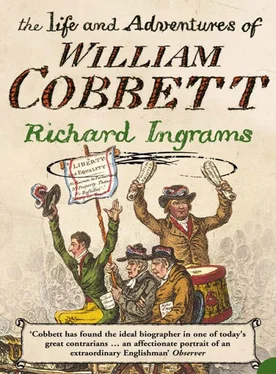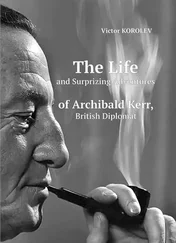1 ...7 8 9 11 12 13 ...20 McKean, a proud, vain man, was not the sort of person to forget such an attack. In 1797, following the second of two outbreaks of yellow fever in Philadelphia, a further opportunity for prosecution arose as a result of Cobbett’s libels of another of the city’s most distinguished citizens, Dr Benjamin Rush. Rush (1745–1813) was, like McKean, a signatory of the Declaration of Independence, a close friend of Noah Webster and a fanatical republican. He had begun his career as a lawyer but changed to medicine, studying at Edinburgh University and St Thomas’s Hospital, London (where he met Dr Johnson, Oliver Goldsmith and Joshua Reynolds). Returning to Philadelphia, he began to practise medicine and had already made a name for himself when the War of Independence broke out. Rush was appointed Surgeon General to the armies, but quarrelled with George Washington and returned to his medical practice. Though a pioneer in many medical and veterinary fields (he has been credited with the possibly dubious distinction of being the founder of American psychiatry), his approach to more conventional medical matters was misguided, to put it mildly. Following the lead of the famous Edinburgh physician John Brown, Rush came to believe that nearly all ailments, even the common cold, sore throat or headache, were caused by ‘a state of excessive excitability of a spasm in the blood vessels’, and hence in most cases called for the one treatment of ‘depletion’ through bleeding and purging. ‘This conception was so simple that it came to hold for his speculative mind all the fascination of an ultimate panacea.’ 8
The test of Rush’s theory came in 1793 when the first of the epidemics of yellow fever struck Philadelphia, resulting in the death of several thousand citizens. Basing his remarks on Rush’s own account (published in 1794), Cobbett later described the doctor’s technique, prior to his discovery of bleeding.
At the first breaking out of the Yellow Fever, he made use of ‘ gentle purges ’; these he laid aside, and had recourse to ‘ a gentle vomit of ipecacuanha ’; next he ‘ gave bark in all its usual forms, of infusion, powder and tincture, and joined wine, brandy and aromatics with it ’; this was followed by ‘ the application of blisters to the limbs, neck and head’ ; these torments were succeeded by ‘ an attempt to rouse the system by wrapping the whole body in blankets dipped in warm vinegar’ ; he next ‘ rubbed the right side with mercurial ointment, with a view of exciting the action of the vessels through the medium of the liver ’; after this he again returned to bark, which he gave ‘ in large quantities and in one case ordered it to be injected into the bowels once in four hours ’; and, at last, having found that wrapping his patient in blankets dipped in warm vinegar did no good, he directed buckets full of cold water to be thrown frequently upon them !!!
Surprising as it may seem his patients died !
Rush was not a bad man, in fact he was a very conscientious and industrious practitioner. But he was excessively vain, quick-tempered and lacking in humour (he must have been painfully aware that the high death rate disproved his claim that the yellow fever was no more dangerous than measles or influenza). The attack coming from an Englishman, one moreover with no knowledge at all of medicine, was doubly insulting to a man of his self-importance. He later wrote of receiving torrents of abuse from ‘one Cobbett, an English alien who then resided in Philadelphia’, 9 and in October 1797 he issued a writ for libel. But if he was hoping thereby to silence his antagonist, he was unsuccessful. ‘The Doctor,’ Cobbett wrote, ‘finds his little reputation as a physician, in as dangerous a way as ever a poor yellow fever man was in, half an hour after he was called to his aid. We wanted no hints from Dr Rush. We know very well what we ought to do; and, if God grants us life we shall do it completely.’
Cobbett accordingly redoubled his attacks on the doctor. Among other misdeeds, Rush, he claimed (7 October 1797), had ‘appointed two illiterate negro men and sent them into the alleys and bye places of the city, with orders to bleed and give his sweating purges, to all they should find sick, without regard to age, sex or constitution; and bloody and dirty work they have among the poor miserable creatures that fell in their way … I know several that he terrified into chilly fits, some into relapses and some into convulsions, by stopping them in the street and declaring they had the fever – You’ve got it! You’ve got it! was his usual salutation upon seeing anyone with a pale countenance.’
Rush’s action against Cobbett for libel was set down for trial in December 1797. Realising that he had little chance of successfully defending the suit in Philadelphia, Cobbett had made an application to Chief Justice McKean to have the case transferred to the Federal Court – which, he claimed, as an alien, he was entitled to do by the American Constitution:
It was towards the evening of the last day of the session when Mr Thomas [Cobbett’s lawyer], albeit unused to the modest mode, stole up gently from his seat, and in a faint and trembling voice, told the Bashaw [Pasha] McKean that he had a petition to present in behalf of William Cobbett. For some time he did not make himself heard. There was a great talking all round the bar; Levi, the lawyer was reading a long formal paper to Judges, and the judges were laughing over the chitchat of the day. Amidst the noisy mirth that surrounded him, there stood poor Thomas, with his papers in his hand, like a culprit at school just as the boys are breaking up. By and by, one of those pauses, which frequently occur in even the most numerous and vociferous assemblies, encouraged him to make a fresh attempt. ‘I present’ says he ‘may it please your honours, a petition in behalf of William Cobbett.’ The moment the sound of the word Cobbett struck the ear of McKean he turned towards the bar, and having learnt the subject of the petition, began to storm like a madman. A dead silence ensued. The little scrubby lawyers (with whom the courts of Pennsylvania are continually crowded) crouched from fear, just like a brood of poultry, when the kite is preparing to pounce in amongst them; whilst hapless Thomas, who stood up piping like a straggled chicken, seemed already to feel the talons of the judicial bird of prey. He proceeded, however, to read the petition, which being very short was got through with very little interruption, when he came to the words, ‘subject of his Britannic Majesty,’ McKean did, indeed grin most horribly, and I could very distinctly hear, ‘Insolent scoundrel!’ – ‘damned aristocrat’ – ‘damned Englishman!’ etc etc from the mouths of the sovereign people. But neither their execration, nor the savage looks that accompanied them, prevented me from fulfilling my purpose. I went up to the clerk of the court, took the book in my hand, and holding it up, that it might be visible to all parts of the hall, I swore, in a voice that everyone might hear, that I preserved my allegiance to my King; after which I put on my hat, and walked out of the Court followed by the admiration of the few and by the curses of the many.
McKean, predictably, threw out the petition, and after many delays the case finally came in on 13 December 1799. By this time, anticipating certain defeat, Cobbett had left Philadelphia and was living in New York. The move was only partly dictated by prudence. The political mood had changed, the pro-French frenzy had subsided – Napoleon had taken charge in France – and as a result the circulation of Porcupine’s Gazette , which had relied so much on attacking the Jacobins, had declined. Cobbett’s intention, however, was to resume publication of the paper in New York, where he would be out of McKean’s jurisdiction. ‘Yesterday,’ he wrote to his friend Edward Thornton at the British Embassy (18 November 1799), ‘all my goods sailed for New York, so that they are no longer, I hope, within the grasp of the sovereign people of Pennsylvania. I have some few things left at my house in 2nd Street, which will there be sold by auction, under the direction of one of my friends: in the meantime I am preparing to follow the rest, and I propose to set out from here about this day week.’ Cobbett left town on 9 December, and four days later McKean brought on the Rush libel action before three of his old colleagues. The president was Justice Edward Shippen, a candidate for McKean’s former position of Chief Justice. At the end of the case, which lasted only two days, the jury awarded Rush damages of $5000, and four days later Justice Shippen was rewarded with the job.
Читать дальше











